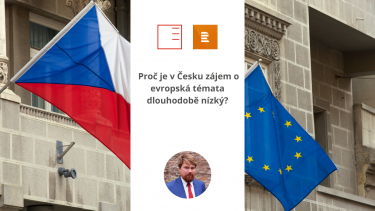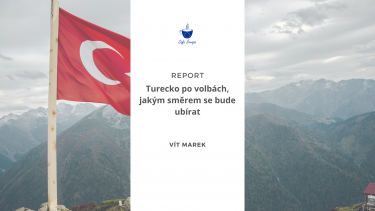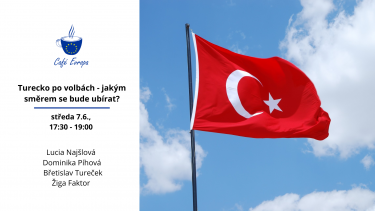RevivEU
RevivEU project, carried out by four leading institutions in the V4 countries, looks at the needs, concerns and fears of the V4 citizens in four various EU-related topics. It does so through both quantitative and qualitative research of citizens´ attitudes towards climate change, migration, covid-19 and the rule of law. It also analyses the governmental policies in these four main areas and how the communication of these policies is framed in the public discourse.
Show moreČRo Plus: Why is the interest in European issues low in the Czech Republic?
Next year, citizens in all EU countries will vote for a new Parliament. In the Czech Republic, turnout in European elections is usually low. Our Executive Director Martin Vokálek spoke to ČRo Plus about the Czech approach to the European Parliament elections and the key electoral topics.
Show more
Report | Café Evropa: Turkey after the elections, what direction it will take
On Wednesday, June 7, a debate took place as part of the Café Evropa cycle, on the topic: "Turkey after the elections, which direction will it go?". The invitation to the debate was accepted by Lucia Najšlová, political scientist and author of the book Turkey and the EU: The Politics of Belonging, as well as by Deník N journalist Dominika Píhová and Břetislav Tureček, head of the Center for Middle East Studies at the Metropolitan University in Prague. The debate was moderated by Žiga Faktor, the head of the Brussels office of the EUROPEUM Institute for European Policy.
Show moreRTVS: The position of the far right in the EU
Klára Votavová, our research fellow, was interviewed by Slovak RTVS about the future of the European Union and Germany.
Show moreEURACTIV.cz: "Being prime minister is still more than being a heavyweight in Brussels." Boss von der Leyen is falling apart Commission
The head of our Brussels office, Žiga Faktor, spoke to EURACTIV.cz about the departure of Dutchman Frans Timmermans from the European Commission. The influential vice-president of the European Commission was lured by the prospect of the prime minister's chair in the Netherlands, and his boss, Ursula von der Leyen, has to manage without him. But her difficulties do not end there, a year before the European elections.
Show more
INVITATION | EU±// Election season in Central Europe - what lies ahead for our region?
We would like to invite you to the next debate in the EU± series, this time on the topic "Election season in Central Europe - what lies ahead for our region?". The debate will take place online on 19 June at 18:00.
Show moreRadiožurnál: Hungary without the Presidency? A slap in the face for Orbán and a sign of EU frustration with his policies, says expert
In the Bruselské chlebíčky podcast, the head of the Brussels office of the EUROPEUM think-tank comments on the situation with the upcoming European Presidency. The incoming Spanish presidency is currently open-ended, due to the upcoming Spanish elections, and the Hungarian presidency next year is one that MEPs would prefer to abolish altogether.
Show more
INVITATION | Café Evropa online: Turkey after the elections - what direction will Turkey take?
We cordially invite you to the next debate in the Café Evropa online series, this time on the topic "Turkey after the elections - what direction will Turkey take?". The debate will take place on Wednesday 7 June.
Show moreCRo Plus: Voters will make a final decision about the Turkish president in 14 days
Turkish President Recep Tayyip Erdogan is currently leading the election over opposition candidate Kemal Kiliçdaroglu. But the voters will decide on the Turkish president in 14 days. Žiga Faktor, head of the Brussels office of the EUROPEUM Institute for European Politics, commented on the course of the elections for Český Rozhlas Plus.
Show more
EU MONITOR | THREE RESPONSES TO DISINFORMATION IN THE EUROPEAN UNION
Disinformation and foreign interference have been concerns in global politics for centuries, but social media algorithms have made the current threat more dire as they amplify content based on human frailties such as our obsession with negativity and outrage. Russian interference in the 2016 US federal election and other elections and referenda in at least twenty countries between November 2016 and April 2019, including the Brexit referendum, the French and German elections, and the Ukrainian power grid cyber-attacks, have highlighted the potential for foreign governments to alter the results of an election or undermine democracies using social media and other means. Writes Jakub Ferenčík in his last EU MONITOR.
Show more PDF
Staroměstské náměstí 4/1
Prague 1 - Staré Město
110 00
tel.: +420 212 246 552
email: europeum@europeum.org
https://www.europeum.org









